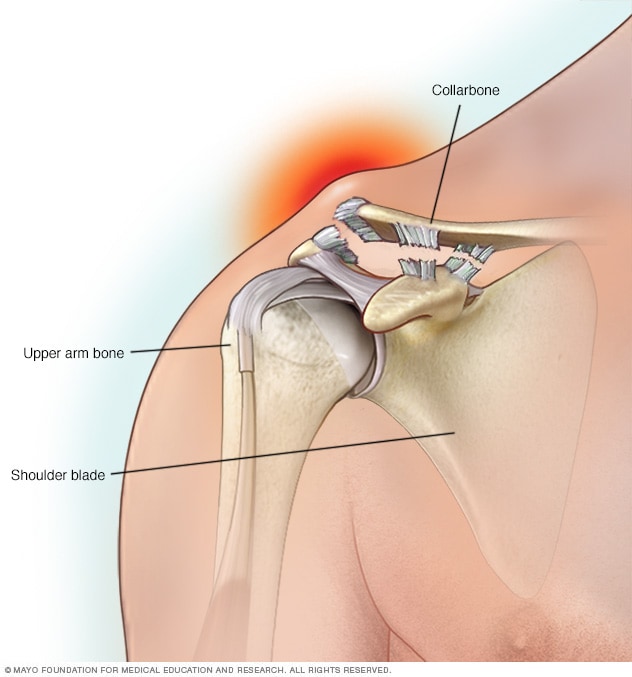Separated shoulder
Overview
A separated shoulder is an injury to the ligaments that hold your collarbone (clavicle) to your shoulder blade. In a mild separated shoulder, the ligaments might just be stretched. In severe injuries, ligaments might be torn.
In most people, a separated shoulder doesn't usually require surgery. Instead, conservative treatment — such as rest, ice and pain relievers — is often enough to relieve the pain. Most people regain full shoulder function within a few weeks after having a separated shoulder.
Symptoms
Signs and symptoms of a separated shoulder might include:
- Shoulder pain
- Shoulder or arm weakness
- Shoulder bruising or swelling
- Limited shoulder movement
- A bump and swelling at the top of your shoulder
When to see a doctor
Contact your doctor if you have persistent tenderness or pain near the end of your collarbone.
Causes
The most common cause of a separated shoulder is a blow to the point of your shoulder or a fall directly on your shoulder. The injury may stretch or tear the ligaments that hold your collarbone to your shoulder blade.
Risk factors
Participating in contact sports, such as football and hockey, or in sports that can involve falls — such as downhill skiing, gymnastics and volleyball — might put you at higher risk of a separated shoulder.
Complications
Most people fully recover from a separated shoulder with conservative treatment. Continued shoulder pain is possible, however, if:
- You have a severe separation that involves significant displacement or fracture of the collarbone
- You develop arthritis in your shoulder
- Other structures around your shoulder, such as the rotator cuff, are damaged
Diagnosis
A separated shoulder can usually be identified during a physical exam. X-rays can sometimes confirm the diagnosis and determine the severity of the injury. But in many people who have a low-grade separated shoulder, early X-rays are often normal.
Treatment
Most people enjoy a full recovery after conservative treatment. A minor separation usually heals within a few weeks. A more severe separation might take several weeks to months to heal. You might always have a noticeable bump on the affected shoulder, but it shouldn't affect your ability to use that shoulder.
Medications
Over-the-counter pain relievers, such as acetaminophen (Tylenol, others), ibuprofen (Advil, Motrin IB, others) and naproxen sodium (Aleve), may help ease shoulder pain.
Therapy
- Rest. Avoid activities that aggravate your shoulder pain, especially crossing the affected arm in front of your body. You might want to temporarily immobilize your arm in a sling to take pressure off your shoulder and promote healing.
- Ice. Ice can reduce shoulder pain and swelling. Use a cold pack for 15 to 20 minutes at a time.
- Physical therapy. Stretching and strengthening exercises can help restore strength and motion in your shoulder.
Surgical and other procedures
If pain persists or if you have a severe separation or fracture of the clavicle, surgery might be an option. Surgery can reconnect torn ligaments and reposition or stabilize injured bones.
Preparing for your appointment
You're likely to start by seeing your family doctor or a general practitioner. However, if your separated shoulder is severe, you might be referred to a doctor who specializes in bones and joints.
Here's information to help you get ready for your appointment.
What you can do
Make a list of:
- Your symptoms, including any that seem unrelated to the reason for your appointment
- Key personal information, including recent accidents or participation in contact sports
- All medications, vitamins or other supplements you take, including the doses
- Questions to ask your doctor
Take a family member or friend along, if possible, to help you remember the information you're given.
For a separated shoulder, some basic questions to ask your doctor include:
- How severe is my injury?
- Will I need surgery?
- How long before I regain strength in my shoulder?
- Will I be able to return to my sport after I recover?
- What can I do to protect my shoulder from future injuries?
- Do you recommend any particular exercises to strengthen my shoulder?
- Do you have brochures or printed material that I can have? What websites do you recommend?
Don't hesitate to ask other questions.
What to expect from your doctor
Your doctor is likely to ask you several questions, such as:
- How much does your shoulder hurt on a scale of 1 to 10?
- When did your shoulder pain begin?
- Do you have numbness or tingling in your arm or hand?
- Do you know what triggered your symptoms? For instance, have you fallen or participated in contact sports recently?
- Have you injured your shoulder before?
- What, if anything, seems to improve your pain?
- What, if anything, appears to worsen your pain?

Comments
Post a Comment